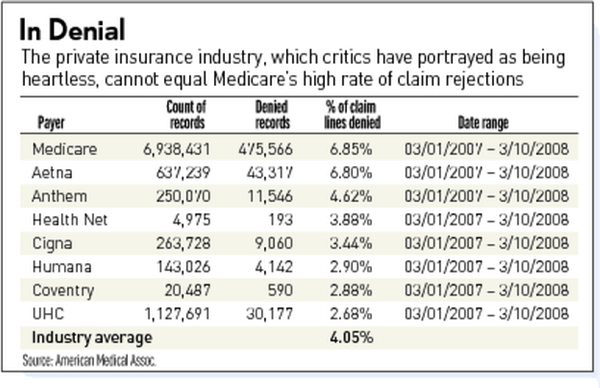
California's Road To Single-Payer Ruin

4/27/2017
http://www.investors.com/politics/editorials/californias-road-to-single-payer-ruin/
Socialized Health Care: Never let it be said that California doesn't march to the beat of a different drummer. While the rest of the country has had second, third and even fourth thoughts about having a single-payer health care system, the Golden State boldly marches forward into fiscal oblivion.
As the Los Angeles Times reported Wednesday, "A sweeping measure that would establish government-run universal health care in California cleared its first legislative hurdle Wednesday as scores of supporters crammed into the Capitol to advocate for a single-payer system."
Let's unpack that sentence a bit. It's true that so-called State Bill 562 is "sweeping." It's so sweeping, in fact, that it would likely end the private health insurance business in the state and lead to fiscal bankruptcy. How's that for sweeping?
And guess what? The measure covers illegal immigrants. So, if this bill is passed, California will turn into a massive medical magnet for sick people from Latin America and possibly even Asia. Why pay for health care in your home country when you can get it in California for free?
Then there's that bit about clearing "its first legislative hurdle." That's not much of a hurdle, really. Thanks to a permanently gerrymandered political landscape and years of Democrats bending the rules to systematically disenfranchise all nonleft political alternatives, California is now a one-party state.
Democrats, funded by their public-sector union allies, have total control of the legislature, universities, school systems, bureaucracy and courts.
All of it.
As for those "scores of supporters," well, as we noted above, these aren't average people, working a gig who show up in the middle of the day at the State Capitol to advocate for a dearly held ideal. No. The "supporters" are union organizers and officials including the California Nurses Association, the California Labor Federation, and a handful of so-called "consumer groups."
This is why this single-payer plan is the most extreme proposal of its type. As the Times says, "The state would pay for all medical expenses, including inpatient, outpatient, emergency services, dental, vision, mental health and nursing home care."
That is, everything. And it would be paid by "broad-based revenue." That means massive, and we mean massive, taxes on everyone.
What's surprising is that any state would consider such madness. As Pacific Research Institute President Sally Pipes wrote in IBD recently, "Since ObamaCare became law seven years ago, the case for single-payer has only grown less convincing."
It's not as if other states haven't tried. Vermont, possibly the only state rivaling California in terms of its far-left politics, passed a single-payer plan into law in 2011. But Gov. Peter Shumlin, the progressive politician behind the law, took one look at the $4.5 billion annual cost which would have required an 11.5% payroll tax, along with a separate tax on individuals of as much as 9.5% and said "No thanks." He quietly shut it down in 2014.
Inspired by the Clinton health care plan, a number of other states in the 1990s took steps toward a single-payer system.
Tennessee was one of them. "TennCare bled so much money the sales-tax-only Volunteer State repeatedly scaled back the program and even considered adopting a state income tax just to pay for its health care plan," wrote Merrill Matthews, a resident scholar with the Institute for Policy Innovation in Dallas, in a piece that appeared in IBD last month.
Kentucky, too, went down that road in the 1990s. It passed a new law requiring insurers to cover everyone who applied, no matter what. At the start of KentuckyCare, the state had 45 insurers. Within just a few years, it had only three. The plan was mostly dismantled in 2000.
California is now heading into even more extreme terrain. Gov. Jerry Brown, Democratic Lt. Gov. Gavin Newsom and virtually all the Democratic Party's leadership are solidly behind the idea.
But hard facts never disappear, even if you ignore them. Back in 2008, California's nonpartisan legislative analyst looked at single payer. What it found wasn't surprising: The costs would be gargantuan, dwarfing anything the state had ever done before. Even if you imposed a tax of at least 11% on all workers and spent all the private and public money now spent on health care to pay for a single-payer health program, you'd still come up nearly $40 billion short annually.
Progressives in other contexts call this "unsustainable." Those of us with common sense call it a disaster, a fiscal nightmare, one that will send the state so deep into the red it might not ever recover.
From the passage of a job-killing $15-an-hour minimum wage to the recent imposition of the biggest tax hike in state history to its continued expansion of the nation's most-generous welfare state, California continues to do financially insane things. A single-payer health care plan will push the state over the fiscal edge, sending businesses and disgusted citizens fleeing to neighboring states, with no one left to pay for it all.
Californians, you have been warned.